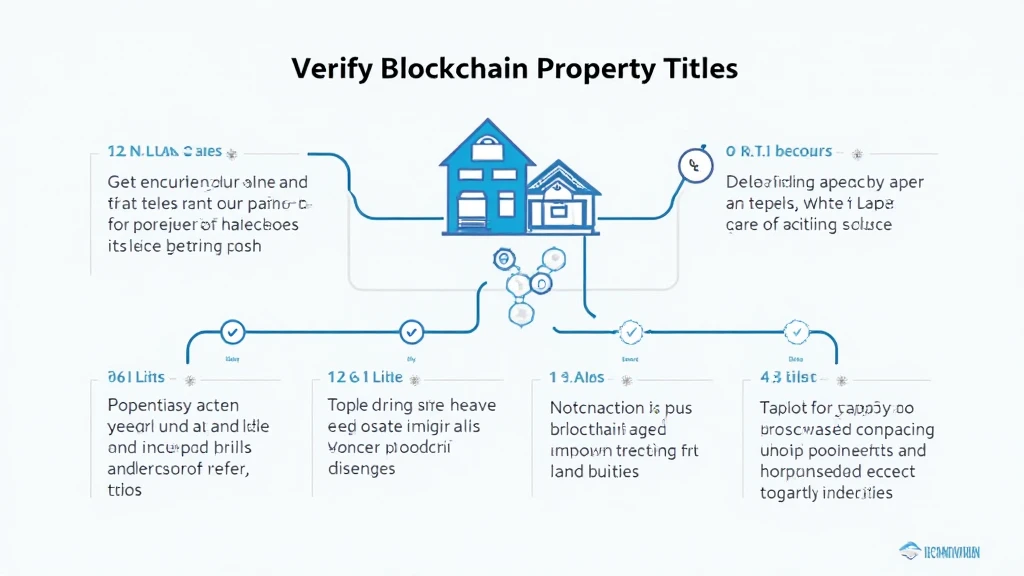How to Verify Blockchain Property Titles: A Step-by-Step Guide
In recent years, the real estate industry has undergone a digital revolution, leading to more secure, transparent transactions through blockchain technology. With the increasing adoption of blockchain solutions, it becomes crucial for both property buyers and sellers to understand how to verify blockchain property titles. In fact, according to a report, over 30% of real estate transactions are expected to utilize blockchain by 2025. This article will guide you through the essential steps and considerations for verifying property titles on the blockchain.
The Importance of Blockchain in Real Estate
The implementation of blockchain technology in real estate is not merely a trend; it represents a significant shift in how properties are bought, sold, and managed. The core attributes of blockchain, such as decentralization, transparency, and security, improve the overall efficiency and integrity of property transactions.
One crucial aspect is title verification. Traditionally, title verification can be a cumbersome process, requiring a series of checks and balances through local registries and legal entities. However, blockchain simplifies this by providing a single, immutable ledger of ownership records.

In Vietnam, the adoption of blockchain technology has seen a notable increase, with the user growth rate for blockchain applications in real estate reaching 20% annually. This trend opens the door for prospective property owners to engage with innovative systems and tools that enhance their purchasing experiences.
Understanding Blockchain Property Titles
A blockchain property title is a unique digital representation of ownership that resides on a blockchain. Each title is tied to specific properties, allowing for a clear record of ownership history that is nearly impossible to tamper with.
- Immutable Ledger: Each transaction recorded in the blockchain is permanent and cannot be altered.
- Smart Contracts: These are self-executing contracts with the terms of the agreement directly written into code.
- Decentralization: Unlike traditional systems where a central entity governs the records, blockchain operates on a distributed ledger, making it more democratic.
To verify blockchain property titles, you must understand how the integration of smart contracts and decentralized ledgers works. This ensures that all involved parties are aware of finalized transactions and their respective rights.
Steps to Verify Blockchain Property Titles
Verifying blockchain property titles may seem daunting; however, breaking the process down into simple steps can make it manageable. Here’s how you can systematically verify a title:
1. Identify the Blockchain Platform
Determine which blockchain platform was used to register the property title. Popular platforms include Ethereum and Hyperledger, which are frequently utilized for real estate transactions.
2. Access the Blockchain Explorer
Using a blockchain explorer, you can search for the specific transaction related to the property title. Enter the unique identifier associated with the property, which is usually available from the seller or their representative.
3. Check the Transaction History
Review the comprehensive history of ownership and past transactions related to the property title. Ensure that the details conform to what is presented by the seller:
- Transaction ID
- Date of transaction
- Parties involved
- Smart contract terms
4. Verify Ownership Authenticity
Ensure that the current owner listed on the blockchain matches the seller’s claim. For example, if the seller provides a smart contract, cross-reference it with the blockchain details.
5. Check for Liens or Disputes
Lastly, confirm that there are no outstanding liens or legal disputes related to the property. A thorough check will prevent potential issues post-purchase.
Potential Challenges in Verifying Property Titles
While blockchain offers numerous advantages, some challenges must be acknowledged:
- Regulatory Compliance: Different regions have diverse laws pertaining to property transactions and blockchain use.
- Technology Adaptation: Not all stakeholders in real estate may be familiar with blockchain technology, leading to resistance or misunderstandings.
- Digital Divide: Access to technology is crucial; areas with low internet penetration may struggle with blockchain adoption.
Conclusion: Embracing Blockchain for Property Title Verification
As the landscape of real estate continues to evolve, the verification of blockchain property titles offers significant advantages for enhanced security and transparency. By understanding the system and leveraging technology, buyers and sellers can ensure that property transactions are executed smoothly.
Remember: Always perform due diligence and consider consulting with experts in blockchain and real estate to further protect your investment. The future of property transactions is here, and by adopting blockchain verification practices, you can safeguard your rights as a property owner.
Stay informed about blockchain trends and developments in real estate and explore our latest articles to navigate this exciting new frontier. If you’re interested in more insights, be sure to read our Vietnam crypto tax guide for comprehensive information on taxation and regulatory considerations.
Author: Dr. Mai Pham, a renowned blockchain researcher with over 30 published papers on digital asset security, specializing in property title verification.




